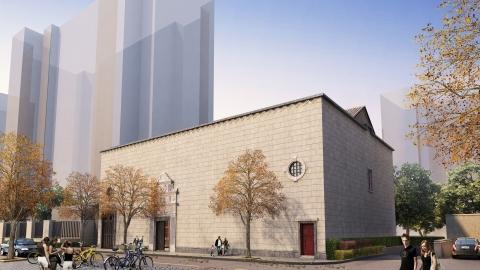The historic Yuanli Pawnshop, described as the largest and best-preserved pawnshop building in Shanghai, will open to the public as a museum this year, cultural officials of Jing’an District said on Monday.
The former site of the 97-year-old Yuanli Pawnshop on Wuding Road, is a three-floor masonry-timber structure. It features a number of Western-design elements, like Roman pillars at its front gate, which have been preserved to date.
Restoration is now underway, which includes the original facade and carvings. Inside, an old-time Yuanli Pawnshop will be recreated to showcase the history of the shop and part of the city’s financial industry. Modern electric and water equipment will be installed.
According to the Jing’an Culture Bureau, it was the largest pawnshop in Shanghai back in 1943. In its heyday, it had a 10-square-meter vault filled with valuables. The vault doors were made with 50-centimeter-thick steel and were so heavy that they required two men to open.
After the pawnshop quietly closed down in 1946, the 1,100-square-meter structure was partitioned into smaller flats occupied by up to 30 families at some times.
In 2011, the pawnshop was officially deemed an immovable historical and cultural relic by the district government and it survived local demolitions in an urban renewal project.
More museums, “red revolutionary” memorials and art galleries will be built, cultural officials said.
Also, historic buildings in the century-old shikumen (stone-gate) neighborhood, Junyili, will be well preserved and restored, and new functions will be added to give the old buildings a new lease of life.
“For example, the former residence of renowned artist Wu Changshuo will be turned into his memorial and museum,” said Zhang Zhong, deputy director of the bureau. “We are still discussing the details.”
Plans for the Siwenli, another well-preserved shikumen neighborhood in Jing’an, are still being drafted. But Zhang confirmed that like Zhangyuan, most of the historic buildings will be preserved and experts will work to explore local culture and history.
“We don’t want to preserve the buildings just because of their historic value — we hope to keep them alive,” Zhang said.
Old factory buildings will also be revived for modern business.
About 7,000 square meters of the abandoned workshops of Shanghai’s time-honored paint manufacturer Marie’s will be renovated to showcase the lifestyle that car brand MINI represents.
The site, on Xinfeng Road, will open to the public in the latter half this year, said Shi Yu, an urban planner from Jing’an Investment Group that is in charge of the project.
Another project of her group is to push Jiangning Road to rival New York’s Broadway or London’s West End.
“We will expand our customer base by introducing more shows for the senior citizens in the area,” she said. “Also, within five years, we will restore historic buildings near Shanghai Art Theater and turn them into new cultural landmarks.”




 A single purchase
A single purchase









